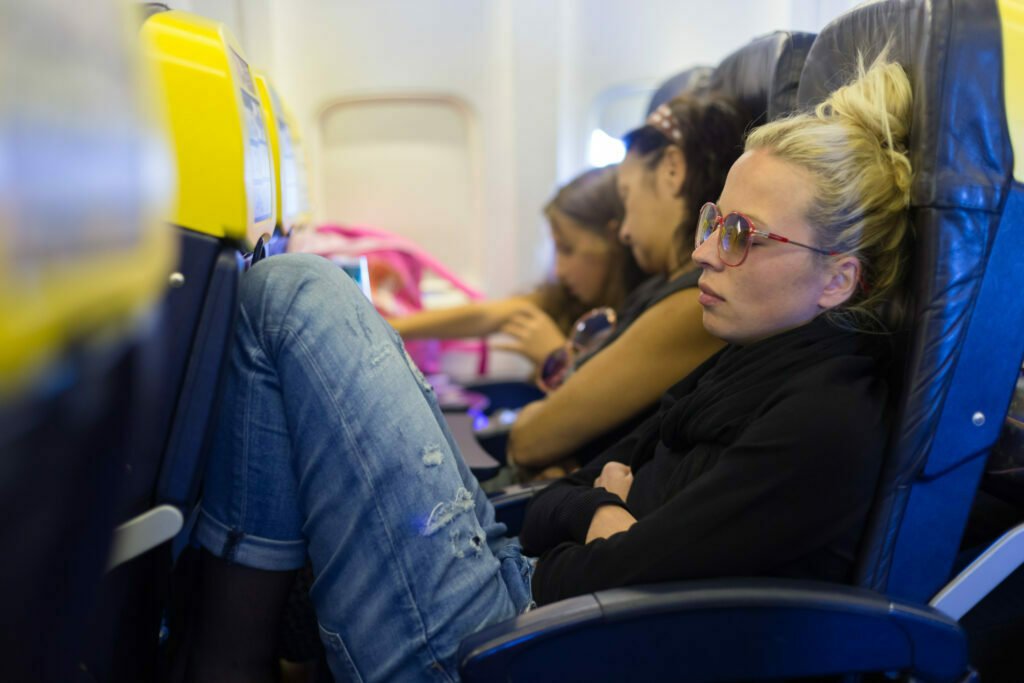Depending on which way you are traveling, jet lag affects you differently. Here are six suggestions for overcoming it.
People are finally flying their way across the globe again; families are being reunited, and sights are being seen, after a few trying years of lockdowns and travel restrictions.

Jet lag, however, which frequently accompanies the pleasures of international travel, can make it difficult to first enjoy a trip and to adjust once you return home.
Why do some people have jet lag? Are there any steps you may take to mitigate its effects?
Why does jet lag occur?
The symptoms that people encounter after traveling swiftly across various timezones are referred to as “jet lag.”
You are synchronized to your local time before traveling. Your body’s rhythms are no longer in sync with the wall clock after you cross into a different time zone.
They are the first signs of jet lag. When you wish to be awake but are actually sleepy, the opposite is true. You may have bloating or nausea if you eat during the day if you are hungry in the middle of the night.
You are physically and intellectually confused until your body clock and all the rhythms it regulates sync with the new local time. Not the best of vacation vibes!
Everyone experiences jet lag differently.
It’s interesting to note that different people react differently to jet lag. That is because everyone of us has a unique internal beat.
The majority of us have a natural 24-hour cycle. Our sleep/wake cycle and other daily rhythms would therefore continue to run at a rate of approximately 24.2 hours if we were living in a cave without any light. This, according to researchers, is an evolutionary adaptation that enables us to adapt to varying day durations throughout the year.
Yet some people’s cycles are a little bit longer than others’, and this might affect how jet lag affects a person.
We don’t know if a shorter cycle helps when traveling the other way, although research suggests that if you have a longer cycle you might acclimate to westward travel more quickly, such as when traveling from Australia to South Africa.
The elderly among us may experience harsher jet lag symptoms since we become a little less resilient as we age.
Which airplane seat is the safest? A seasoned pilot was consulted.
Does it matter which way you go?
In general, many individuals discover that traveling westward, where you “gain” time, is a little bit simpler.
Suppose Sarah and Jasmine leave Adelaide simultaneously. Perth receives Jasmine in the late afternoon, which is almost 2.5 hours earlier in the day. After taking in some sights, she quickly drifts off to sleep at about 8.30 p.m. local time. Then, she begins her day by rising early.
After a few days, Jasmine is completely synchronized since her biological clock automatically delays, moving a bit later in relation to the local time each day.
Almost 2.5 hours later in the day, Sarah lands in Auckland. She makes the most of the warm evening and some of the night by staying up until two in the morning. When the alarm goes off at 7 a.m., she struggles to get out of bed since, according to her body clock, it is still 4.30 a.m.
Jasmine probably won’t experience jet lag as badly as Sarah would, and for a longer period of time. Is jet lag only a “psychological” issue?
Some individuals may ponder whether jet lag is all in your head. In a sense, it is because there is a discrepancy between the internal time of your body, which is set by your brain, and the time where you are.
You can’t, however, convince yourself to get over jet lag. It is more accurately described as a physiological condition than a psychological one.
Fortunately, there are a few easy methods to reduce the effects of jet lag and assist your body clock in adjusting. For professional athletes who travel for competitions, this is especially crucial.
1. First, evaluate whether or not it is worthwhile to try to adjust to the new time. It can make more sense to stay on your home time if the trip is just brief. Start intentionally shifting your own routines, such as when you eat, sleep, exercise, and get sunshine, toward the new timezone if the transition takes more than three days.

2. Starting on the plane is a fantastic idea if you’re trying to change your body clock. Adjust your watch to the time zone of your location and schedule your activities accordingly.

3. Limit your use of alcohol and caffeine when traveling. This will improve your ability to sleep, stay hydrated, and help your body clock adjust to the new time zone.

4. While acclimating to a different timezone, aim to sleep during the local night and only take breaks when you absolutely need to. You can get a boost from quick sleeps to get through the day and nighttime activities. Avoid naps later in the day as you get closer to your real planned bedtime, and aim for roughly 30 minutes.

5. One sign of jet lag is stomach discomfort. Stick to modest meals and only eat when you’re hungry if you frequently get sick or have stomach issues while traveling. When it’s time to eat, your body will let you know. This situation is covered in Tip 3 about coffee and alcohol.

6. Go outdoors. A new time zone adjustment requires sunlight. The timing of your outside activities will depend on your time zone change.





